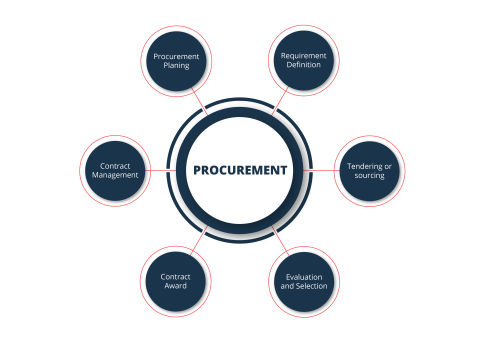It is common to see the procurement as a bottle neck and a time-consuming activity, usually associated with delays and strict bureaucracy. However, procurement activities can be agile and practical if agencies understand the roll that procurement plays, why it exists, what the guiding principles are, and how to manage procedures. Through procurement activities agencies acquire the needed supplies and service to perform our daily organisational activities.
Definition
Procurement is the process of identifying and obtaining goods and services. It includes sourcing, purchasing and covers all activities from identifying potential suppliers through to delivery from supplier to the users or beneficiary ("Global Logistics and Supply Chain Management," 2008).
It´s important to note that procurement is not a single action but a process; a series of activities aimed at meeting the needs of humanitarian projects as well as our operation in general. This process is standardised in such a way that it can be replicated regardless of the place, time or context. At the same time the process should be flexible enough to encompass each of the different challenges that the purchasing manager faces.
The words purchase and procure are frequently used interchangeably; while common using the two words interchangeably is not necessarily accurate. Purchasing is just a part of the procurement process, an important one, but only the specific function associated with the actual buying of goods and services from suppliers. For the sake of this guide, procurement and purchasing will be differentiated along these lines.
Common Terms in Procurement
| Evaluation Committee/ Panel | A committee made up of an odd number of members (at least three) with the necessary technical and administrative expertise to give an informed opinion on tenders or grant applications. |
|---|---|
| BVM | Short for “Best Value for Money”; the best combination available of monetary and non-monetary requirements that an organisation can get from its selection of suppliers. |
| HPCs | Short for “Humanitarian Procurement Centres”. Are not-for-profit organisations specialised in the technical and commercial management of supplies and services necessary for the implementation of humanitarian actions. They can provide technical assistance in procurement or supply pre-established stocks, purchasing or logistics capacity |
| ISO | Short for “International Organisation for Standardisation”. An independent entity that has been thinking and standardising the formulas that describes the best way of doing something. |
| Certification | Guarantee that a product and/or company has followed a quality process. |
| Lead time | The time between initiation of the acquisition of the goods and services up to the time of delivery. |
| Market Analysis | An essential component of context analysis, collecting information that will be useful to program the intervention and how to implement it. |
| Market Research | Activities and means to identify suppliers in a specific market. |
| Negotiated Procedure | Procedure without prior publication of a procurement notice, in which the Contracting Authority consults the candidate or candidates of its choice and negotiates the terms of the contract with one or more of them. |
| Procurement | The process of identifying and obtaining goods and services |
| Purchase | The specific function associated with the actual buying of goods and services from suppliers. |
| QA | Short for “Quality Assurance”; A procedure to ensure the quality of products or services by preventing mistakes and defects in manufactured products and avoiding problems when delivering products or services to beneficiaries. |
| QC | Short for “Quality Control”; checks to ensure quality in a product or a service. |
| Quality | All the elements and characteristics which constitute the product and which contribute to its compliance with the defined technical specifications. |
| Sourcing | Identifying and working with appropriate suppliers. |
| Services | Intellectual and non-intellectual services. |
| Segregation of Duties | Principle by which must have more than one person to complete a procurement activity. |
| TCO | Short for “Total Cost of Ownership”; Cost involved in buying and using a product over time. |
| Tender Procedure | The overall process of putting a contract out for tender, starting with the publication of a procurement notice and ending with the award of the tendered contract. |
| Works | The design and/or the execution of a rehabilitation, construction, etc. in accordance with the previously specified requirements. |


